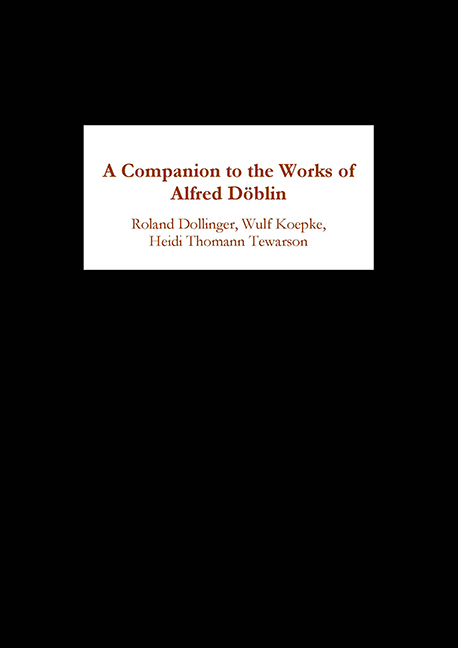Book contents
- Frontmatter
- Contents
- Foreword
- Abbreviations and Translations of Titles
- Works by Alfred Döblin
- Introduction
- Early Works
- Works of the Weimar Period
- The Fall of Wallenstein, or the Collapse of Narration? The Paradox of Epic Intensity in Döblin's Wallenstein
- Technology and Nature: From Döblin's Berge Meere und Giganten to a Philosophy of Nature
- “Arzt und Dichter”: Döblin's Medical, Psychiatric, and Psychoanalytical Work
- Döblin's Berlin: The Story of Franz Biberkopf
- Döblin's Engagement with the New Media: Film, Radio and Photography
- Döblin's Political Writings during the Weimar Republic
- Exile and Return to Europe
- Bibliography
- Notes on the Contributors
- Index
The Fall of Wallenstein, or the Collapse of Narration? The Paradox of Epic Intensity in Döblin's Wallenstein
from Works of the Weimar Period
Published online by Cambridge University Press: 27 April 2017
- Frontmatter
- Contents
- Foreword
- Abbreviations and Translations of Titles
- Works by Alfred Döblin
- Introduction
- Early Works
- Works of the Weimar Period
- The Fall of Wallenstein, or the Collapse of Narration? The Paradox of Epic Intensity in Döblin's Wallenstein
- Technology and Nature: From Döblin's Berge Meere und Giganten to a Philosophy of Nature
- “Arzt und Dichter”: Döblin's Medical, Psychiatric, and Psychoanalytical Work
- Döblin's Berlin: The Story of Franz Biberkopf
- Döblin's Engagement with the New Media: Film, Radio and Photography
- Döblin's Political Writings during the Weimar Republic
- Exile and Return to Europe
- Bibliography
- Notes on the Contributors
- Index
Summary
Unlike many authors of prose fiction in the Expressionist generation, Alfred Döblin had, in addition to his training as a natural scientist and medical doctor, a penchant for theoretical reflections on his narrative craft. In fact, his essays on fiction articulate a distinct and coherent poetics for prose fiction, a “prosaics,” one might say, that he develops in contradistinction to Marinetti's futurism in his essay on “Futuristische Worttechnik” (1915), where he declares with aplomb and bravura: “Pflegen Sie Ihren Futurismus. Ich pflege meinen Döblinismus!” (AzL, 15). In essays such as “An Romanautoren und ihre Kritiker” (1913), he elaborates on this Döblinism as an extension into the modern world of an epic tradition of Naturalism, of literature as an embrace of the world, a literature that has to respond to events and developments in external reality, rather than merely to follow in the footsteps of its predecessors, or impose the author's imperious subjectivity onto the world in the manner of some Expressionists (AzL, 15–19).
His poetics is imbued with historical consciousness as an acute awareness of changes in the present based on knowledge of the past; the novelist needs to remain alert to the transformations in the world and find adequate means of representing them in words. The acceleration of external reality through technology (in transportation and communication, for example) has overtaken the inherited and inveterate sensibility of authors steeped in Romantic notions of empathetic projection (Einfühlung) that lend a psychological coloration to the world. With polemical comments like “Psychologie ist ein dilettantisches Vermuten, scholastisches Gerede, spin-tisierender Bombast, verfehlte, verheuchelte Lyrik” (AzL, 16), Döblin stridently repudiates such notions in favor of a clinical, psychiatric practice of “Notierung der Abläufe, Bewegungen” (AzL, 16). In other words, the novelist should become a sort of detached and impartial stenographer of reality. Such a practice would demystify the poetic word and strip it of its atmospheric aura and patina of symbolic but obscure signification, as cultivated, for example, by the French Symbolists, and in Germany by Stefan George and his circle; such a contrary practice, in the experimental spirit of Expressionist prose, leads the way “aus der psychologischen Prosa” and, accordingly, puts forward in the novel “die entseelte Realität” (AzL, 17).
- Type
- Chapter
- Information
- A Companion to the Works of Alfred Döblin , pp. 75 - 92Publisher: Boydell & BrewerPrint publication year: 2003



